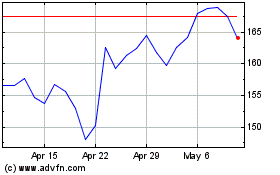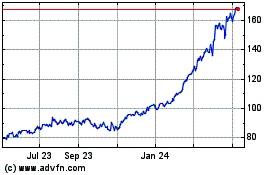Report prepared for the company lays out corruption allegations
against key partners
By Ted Mann
This article is being republished as part of our daily
reproduction of WSJ.com articles that also appeared in the U.S.
print edition of The Wall Street Journal (November 19, 2018).
General Electric Co. learned from a consultant's report this
past summer of corruption allegations against key business partners
in Iraq, where the company is trying to shore up its position in
one of the most important foreign markets for its struggling power
business.
The industrial giant said it has a robust compliance operation
and doesn't believe it has violated any federal laws, including
ones covering foreign corruption. However, that confidential
report, parts of which were reviewed by The Wall Street Journal,
underscores the dilemma GE faces as it chases new business in one
of the few places with demand for its multimillion-dollar heavy
duty gas turbines.
The study, prepared for GE by corporate intelligence firm
Hakluyt & Co., paints a portrait of widespread corruption and
bribery in the Iraqi power sector, accusing high-ranking officials
in the Ministry of Electricity, from which GE is currently vying
with Siemens AG for $15 billion in new power contracts. Siemens
declined to comment.
The Hakluyt report, based on interviews with business people and
political officials working in the power sector, provides a broad
overview of the corruption concerns in the industry and advises GE
to distance itself from at least one of its contractors. Hakluyt's
staff includes former British MI-6 officers and strategic
consultants from the business world.
One Iraqi government official is quoted in the report estimating
that "not one single contract" in a recent wave of power agreements
"has been done without some kind of deal benefiting one of the
religious and political parties."
The report, prepared for GE this spring, follows a previously
unreported Justice Department inquiry into corruption allegations
against GE employees in Iraq in April. That inquiry was triggered
by a whistleblower complaint alleging employees of GE Power, the
conglomerate's power unit, in the country were involved in
corruption, according to people familiar with the complaint.
GE said it investigated the whistleblower accusation and found
it to be without merit. The company learned of the whistleblower
when U.S. agencies, including the departments of State and
Commerce, withdrew their commercial support for the company's
efforts in Iraq over the accusation. The embassy resumed its
support for GE after the company agreed to investigate the
allegation, the people familiar with the complaint said.
The status of the Justice Department's inquiry into the
whistleblower's claims couldn't be determined. The Justice
Department declined to comment.
However, the corruption concerns are an unwelcome headwind for
GE's power business, its oldest and largest industrial unit, whose
revenues and operating profit have plummeted over the past year,
dragging GE's share price to historic lows. Management has said
reversing the decline of the power business will take years. In the
quarter ended Sept. 30, the power business recorded a $631 million
loss, and took a $22 billion goodwill charge, writing down
virtually all of the goodwill in the business.
Ties to bribery and corruption in foreign markets, even among
third-party partners, could mean the possibility of violations of
the Foreign Corrupt Practices Act among other laws -- and millions
of dollars in fines.
The industrial giant has "robust processes for all kinds of
ethics and compliance issues," a spokeswoman said. "We believe that
based on our review, the company hasn't committed any FCPA
violations or violated any other laws."
GE shares closed down 1.9% on Friday to close at $8.02, a
roughly 45% fall over the past six months.
The Hakluyt report warned about corruption allegations against
construction magnate Ali Shamara, a central figure in the Iraqi
power sector, with whom the company has worked on multiple projects
since 2004, including a massive 2008 deal in which GE sold 56 9E
turbines to the Iraqi Ministry of Electricity. Mr. Shamara's firm
was contracted to install some of the units.
"Ali Shamara earned his fortune largely through his relationship
with former Prime Minister Nouri al-Maliki," Hakluyt said in its
report. "This presents what is acknowledged by these contacts as a
real dilemma: currently, any firm that completely avoids Ali
Shamara will struggle to win major contracts from the (Ministry of
Electricity), yet any firm that partners with him runs -- at the
very least -- serious reputational risks."
And yet, the report concedes that to win business in a market
like Iraq, the company may have to do business with figures like
Mr. Shamara.
Mr. Shamara's company "remains essential" to operating in the
Iraqi power sector, the document said.
Mr. Shamara, in an interview, staunchly denied allegations of
corruption on the part of himself and his firm, International Free
Company, which is currently wrapping up its postconstruction work
with GE on the rebuilding of a power plant called Baghdad South. He
said he expected to continue to play a major role in Iraqi power
projects, and hoped to work with GE in the future.
"We had no corruption with GE," Mr. Shamara said. "Zero."
GE said that its customer vetting process didn't raise any red
flags about corruption in its past dealings with Mr. Shamara. The
company also said it doesn't have any future projects scheduled
with Mr. Shamara's companies or any plans to bid on future work
with his companies.
GE said its operations ensure its employees and business
partners operate within the bounds of the law.
However, one question debated within GE Power, according to
people familiar with the matter, is why its dealings with Mr.
Shamara had never raised concern. The company declined to comment
on the reported debate.
The company said it hired Hakluyt this spring to review its
local network of contractors who install turbines and build out
power plants as part of a broader internal review of its power
business in the country. GE added it doesn't necessarily agree with
the findings of consultants like Hakluyt, but the company views
their findings as "important input in our investigative process," a
spokeswoman said.
The Hakluyt report quotes businessmen accusing officials in the
Ministry of Electricity, including Deputy Minister Abdul Hamza Hadi
Aboud, of demanding bribes before allowing power plant construction
projects to go forward. Neither Mr. Aboud nor the Ministry of
Electricity responded to requests for comment.
Hakluyt also warned about a Turkish contracting firm with which
GE has business in Iraq. Several senior Iraqi and Turkish
politicians have said they believe it might be a front for the
business interests of a senior official in Ankara, though Hakluyt
couldn't independently confirm the politicians' statements, the
report states.
"You are probably on safer ground with your Turkish partner,"
the report said, adding, "You will also want to be realistic about
the fact that any firms working in Iraq -- even Turkish ones -- are
required to work through Iraqi partners." The Turkish company and
the Turkish embassy didn't respond to requests for comment.
The findings have caused concern at the highest levels of GE,
and have been included in briefings for Chief Executive Larry Culp,
according to people familiar with the matter.
--
Ali Nabhan
and
Ian Talley
contributed to this article.
Write to Ted Mann at ted.mann@wsj.com
(END) Dow Jones Newswires
November 19, 2018 02:47 ET (07:47 GMT)
Copyright (c) 2018 Dow Jones & Company, Inc.
GE Aerospace (NYSE:GE)
Historical Stock Chart
From Mar 2024 to Apr 2024

GE Aerospace (NYSE:GE)
Historical Stock Chart
From Apr 2023 to Apr 2024
